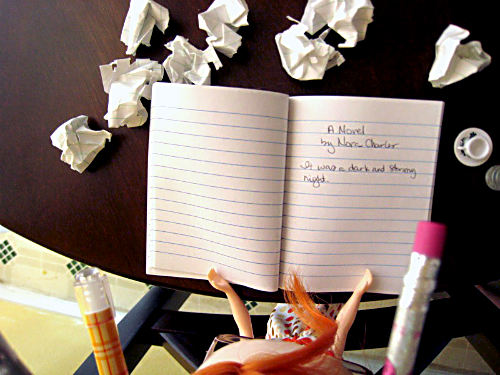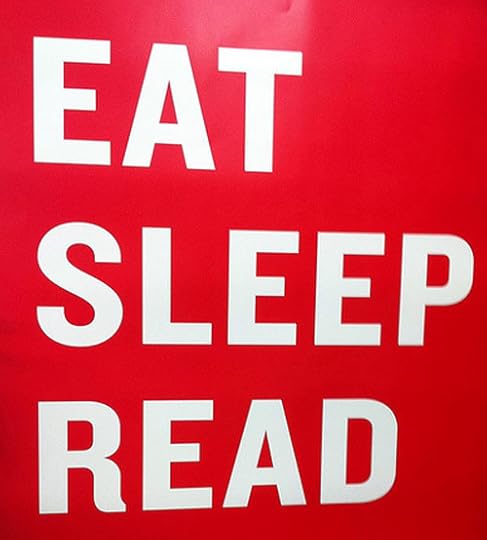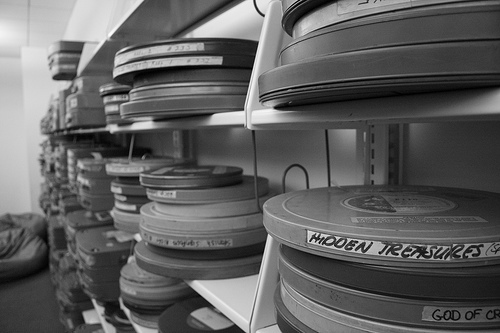Chris Baty's Blog, page 236
June 13, 2012
Writer's Block

You know that feeling you get when you are staring at a blank page that you know is supposed to be filling up with beautiful language, only to find that nothing is happening? Of course you do, you’re Wrimos. Writer’s block can come with making writing a part of your daily reality for an entire month, whether in November, or June or August, for those campers among you.
A 2010 Psychology Today article by Dr. Bill Knaus offers ten tips for overcoming writer’s block—that sensation of creative emptiness we sometimes experience when we intend to write. Since I’m currently dealing with a bout of creative blockage (regarding what to blog about, if you hadn’t guessed), and I imagine that many of you have or will suffer the same affliction this month, I thought I’d share his tricks.
The sentences in italics are taken directly from the article; the un-italicized commentary is my own.
1. Look for your procrastination trigger. Dr. Knaus names some possible triggers, including self-doubt and perfectionism. I doubt that these are major issues for many of you, who endeavor to write entire novels in a month, but for anyone who does harbor such insecurities—don’t! We love you the way you are! And remember, no one expects you to write a good novel just yet; this is a rough draft that you’ll have eleven months to revise.
2. Adopt a reasonable perspective. Okay, this probably doesn’t apply either. I’m not even going to pretend that producing 50,000 words in 30 days is completely reasonable. But, as thousands of Wrimos have proven over the years, it is doable, and exhilarating, no?
3. Prepare to think independently. I like this one. Dr. Knaus urges you to write for yourself, not for others. Constantly worrying about your potential audience’s reaction to your work can slow you down tremendously, and, as you know, time is the critical factor during your annual streak of prolific composition.
I’d say that the need for approval inhibits your creativity as well, or at least your willingness to act on your creative impulses, because you’re too worried about pleasing others to take risks.
4. Map your cognitive-emotive-behavioral writing procrastination process. I would suggest postponing this activity until the end of June or August (or November), when you won’t be spending all your free time trying to bang out that word count. But, when you have the chance, take a moment to reflect on your typical cycle of procrastination and consider some ways to disrupt it.
5. Decide when to start, and commit to that time. This is Wrimo-appropriate advice if I ever heard it. Dr. Knaus suggests setting a time to begin writing and really forcing yourself to stick to it.
6. To boost your motivation, set up a reward and penalty system. You may already do this, but here’s a helpful hint from Dr. Knaus: administering small rewards at frequent intervals boosts motivation more effectively than does setting a bigger reward for the distant future. Small handfuls of Skittles every few hundred words, rather than holding out for that king-size bag at the end of the month.
7. Expect inertia and prepare to meet that challenge. Isn’t that the whole point of your article, Dr. Knaus?
8. Distinguish between “can’t” start and “won’t” start thinking. Writer’s block is entirely “won’t” start thinking. It’s not that you suddenly lose all mental capacity; it’s that whatever your mind produces seems stupid or boring or unoriginal. You can put words into coherent sentences no matter what, so just keep doing it. Eventually, you’ll regain that creative flair.
9. Plan for re-writes. You’re not going to pen the next War and Peace in 730.484398 hours (I needed a new way of describing this time frame). Schedule an outpouring of pent-up literary discretion for your revision period; now, your task is to write as much as you can.
10. Rather than view yourself as stuck in a writing procrastination rut, focus on the free-will component of writing. Basically, tell your free will that it wants to write a novel in a month.
You can view the article here. What do you think of these tips? What do you do when you get writer’s block? And—the secret agenda behind all of this—any ideas for my next post?
— Lydia
Photo by Flickr user SewPixie.
June 12, 2012
Miss Mia and the Amazing Gobstopper

Meet Mia, the Pomeranian that I live with. Officially, she belongs to my roommate. However, I have the unmatched privilege of walking her a few times every week.
Mia is a fairly simple diva: she likes to be told how beautiful she is, she likes chewing on the expensive bones I bring home from my restaurant job once a week, she likes her fancy toys (that green ball you see cost about five dollars—for a dog toy!—but it was a necessary replacement of her favorite toy, the gobstopper, which fell over the ledge of our balcony).
She’s got plenty of charm, but my favorite thing about Mia is her utter refusal to fail:
You see, like many dogs, fetch is her game of choice. She’ll find whatever chew toy has caught her fancy for that hour, take it to the nearest human, and drop it in their lap, expecting it to be thrown within the next 15 seconds.
This gets old in about the same amount of time. Often, I’ll look sternly at her, tell her no, and place the toy on the floor. She’ll walk away, occasionally looking back at me as if my refusal to play is a marker of my insanity. But, lo and behold, about a minute later, Mia is back with her toy and her insistent little smile that makes me give in and throw the toy for her yet again. The earlier rejection is clearly forgotten; Mia always bounces back.
I think her interpretation of rejection is a good lesson for those of us who walk upright. When she’s told ‘no’, or when something doesn’t go her way, she doesn’t see it as a personal flaw or a failing on her part. It’s merely a small kink in her plan, and she’ll return to the pursuit of her goal soon enough, with no doubts about her inevitable success.
So, it’s with Mia in mind that, despite my earlier failure to write much of script this past April, I plan to undertake another OLL challenge and write a Camp novel this August.
I encourage everyone else in a similar pickle to do the same. So who’s with me?
— Shelby
June 11, 2012
Thirty Pounds of Chocolate in a Pillowcase (and Other Outlandish Motivators)

When I was thirteen, I confronted that ancient and all-American coming-of-age ritual: my Bar Mitzvah.
For the most part, my Bar Mitzvah was a fun and relatively painless experience. I didn’t belong to a temple, so my family got together with five others to find a private Hebrew tutor/rabbi. Tsipi taught the six of us everything we needed to know, and for two years we were a little family of our own. It was great fun—a time of stories, songs, and cookies.
My problem didn’t appear until we got closer to the ceremony itself, and started doing rehearsal run-throughs. As part of his Bar Mitzvah, the lucky thirteen-year-old gets to take the Torah out of the ark and carry it around the room for five minutes while the assembled congregation is invited to touch it. Reasonable enough. There was one problem…
When you think of a Torah, you might think of a little book, like your average Bible or Qu’ran. While such printings do exist, for a Bar Mitzvah you need to use a proper Torah. This means one that comes in the form of a giant scroll, printed on vellum, inked with secret majyyks, and so on. You’re not even supposed to touch it with your hands, just point at it with a little finger on a stick (no joke! Sometimes I have trouble taking my religion seriously.)
The problem was that I was a scrawny little nerd. I wasn’t just unathletic, I was actively anti-athletic. I had trouble with my bags after particularly intense bookstore trips. There was no way I could lift thirty pounds of holy scroll, let alone carry it around for five straight minutes.
Now, I had always been an easy child to handle. I loved vegetables, got sleepy at bedtime, and didn’t even mind going to the dentist. My parents never really had to figure out how to get me to do unpleasant things. Suddenly, they had an impossible task: get me to work out regularly, and quickly enough that I could carry the Torah by my Bar Mitzvah, less than two months away.
First they tried asking, but weights were really not my style. Elementary school had instilled in me a deep loathing for P.E., so the idea of weight-lifting was on the repulsive side. Within two curls, I’d put the weights down in favor of a book.
They tried goading me with favorite foods, but most of what they had on offer I had already learned to cook myself, so that didn’t work. Bribing me with books didn’t work either—I had a huge to-read stack, and knew I’d be getting plenty more to add to the pile as Bar Mitzvah presents.
Finally, they struck on a brilliant solution. Focusing on the lifting side wasn’t working. They needed a new angle. So, instead, they decided to change the weights.
They knew there was one thing I could never resist: chocolate. One day, when I came home from school, I went into my room to find that my wildest dreams had come true. Sitting on my bed was thirty pounds of solid chocolate. Three huge ten-pound chocolate bars. They were glorious. The whole house smelled of the stuff.
Before I could open the first one, though, my mother stopped me, and pulled me back. She put all three into a pillowcase, and handed it to me.
I nearly collapsed under the weight, but I planted my feet and held strong. This was chocolate. I couldn’t drop chocolate.
And so my training began.
Every day, I would walk around the house for two minutes, clutching my chocolate. Its rich fumes would waft into my nose, making me hungrier and hungrier. After my carrying, I was allowed a single piece of gelt (a chocolate coin), which I invariably devoured in seconds.
Eventually two minutes turned into three, then four, and finally five.
It had worked.
My Bar Mitzvah came. I carried the Torah. I didn’t drop it.
My Bar Mitzvah party came. I finally opened the chocolate bars. I raised a giant knife and plunged it deep into that first ten-pound bar, splitting it right down the middle, and then gorged on it like a crazy person.
It tasted like victory.
Fast-forward a decade, and you know what?
I’m still kind of using that technique. When I want to get some real writing done, I stack chocolate chip cookies next to my keyboard. They’re right there. So tasty. They smell so good.
Every 500 words I get to eat one.
They still taste like victory.
What about you guys? Do you have any particularly good stories of strange motivators, or ways you keep yourself motivated as you go after 50,000 for Camp?
—Ben
Photograph by Flickr user rubberpaw.
June 8, 2012
The OLL-iverse: Starlog 1

Hello, OLL fans, and welcome to a new blog feature! On Fridays, we’re going to recap all the goings-on in the world of Letters and Light.
There’s a lot happening every week, whether it be existential crises brought on by too much Twitter whimsy or the latest Yeti sighting in the virtual forest at Camp NaNo’s edge, and it can be hard to keep track of. If you want to make sure you don’t miss the highlights and higher-lights, this post is for you, completionist.
Today’s list has been brought to you by Ben, your camp co-counselor and fan of the Prairie Home Companion.
Camp NaNo:
Week One happened! Breaking News kicked off the week with a post about our dearly beloved Scrivener, and their Camp offer.
As your co-counselor, I sent out a pep talk about writing in caves that you can find in your Camp inbox (Where is that tooting horn coming from?).
The Office had an intense and delicous run-in with some S’mores Cookie Bars, courtesy of a comment recipe from Wrimo Pen and Ink.
Lindsey provides some writing oomph and pizzazz as you head into this second weekend.
On Twitter and Facebook:
Thursday was the big #SummerReading conversation! Figment struggled in vain to get Justin Bieber to promote the hashtag. We love you, Figment! No love, Bieber.
Camp NaNoWriMo launched a game of Two Truths and a Lie with Community Liaison Sarah Mackey.
Our Facebook Friday writing prompt challenged you to write in a genre you aren’t familiar with. (Sword and sorcery? Allie proposes sword and saucery.)
On the forums:
Lots of people shared their typo-tastic NaNo-isms. My personal favorite is probably Stratadrake’s recounting of the oft-forgotten Arthurian baking tale, The Sword in the Scone.
Running out of steam? Need a quick idea to spice things up? Drop by the June Dares thread!
Fun stuff around the net:
Have you seen webcomic author Aaron Diaz’s fantastic X-Men Reboot ideas? Very cool stuff. This follows his previous fantastic reboots, of The Justice League , The Legion of Doom , and of course Batman .
That’s all that’s been going on with us! Tell us how your writing has been going this week in the comments, and/or let us know what you think of our new blog feature!
A Battlestar of Thrones

I like to consider myself a pretty diverse reader, but there’s always been one big exception to that rule. I have never been a fan of the epic fantasy series that span tens-of-thousands of pages, and often come with many years of anxiety-inducing publication delays. (I spent many years worrying that J.K. Rowling was going to be assassinated before finishing Harry Potter. I don’t need more stress like that in my life.)
It’s not that I don’t like fantasy across the board; I just have limited patience for sprawling arcs with hundreds of characters with weird names to keep straight. More power to those of you who love them, but they weren’t for me. With all the buzz of late around Game of Thrones, though, I started to debate whether I should break my long-standing rule against watching movies or TV series before reading the books.
I asked my sister and brother-in-law, fans of both the books and the show, for their advice. My sister, always on the lookout for ways to make me suffer (as all the best siblings do), immediately informed me that I should read the book first.
Ugh.
But I saw an opportunity here. You see, much as I discount doorstop fantasy series out of hand, so too does my sister avoid sci-fi television at almost any cost. So I made her a deal: I would read her beloved Game of Thrones if she would watch my beloved Battlestar Galactica. Both were stories that we’d assumed we wouldn’t like, despite the near-universal love of our friends. This would be a good opportunity to expand our horizons and challenge our assumptions about what we would and wouldn’t like. We made a few specifications: I only have to read the first book, she only has to watch the first season—we agreed that at that point we could make informed decisions about continuing.
So I read the book. And it was really long and there were too many characters and there is just so much description. That’s really where I fall down on these kinds of books. I don’t visualize anything when I read (which always freaks people out—it’s not just me, I swear!), so all that description is just words on a page to me. And when those descriptions are about 50% of a 700-page book, the words on the page begin to look suspiciously wall-like.
On the other hand, the story was pretty compelling, and I liked the entire book a lot more than I’d expected to. I don’t think I’m going to read the rest of them, at least not until the series is finished, because I read about the endless delays and I don’t really want to spend fifteen years worrying about George R. R. Martin’s health. But I’m pretty excited about the show, where two pages of description can be covered in a single establishing shot, and actors’ faces will go along with the many names (not visualizing is a real detriment to keeping huge numbers of characters straight in my head).
We watched the Battlestar Galactica mini-series on Saturday, and my sister only sort of liked it. But I’m going over there tonight to watch the first two episodes of season one, which is where I got completely hooked. I’m crossing my fingers that it will have the same effect on her. Even if it doesn’t, though, I’m hoping that the experience will help her understand what it is she doesn’t like about that kind of show.
I spent a lot of time on Twitter talking about what it is I didn’t like about A Game of Thrones, and it’s made me more articulate about my reading style and preferences. Maybe I didn’t come out of this deal with a new appreciation for a genre of books that many of my friends love, but I did end up with a better sense of self-awareness. There are worse outcomes stemming from deals with your sister, I figure. I’ll keep you posted on her end results.
Do you have any definite blind spots in what you choose to read/write/watch? Do you stick pretty closely to your preferred genres or do you branch out from time to time? Share your reading style and preferences below, and fill us in on the genres you make assumptions about…and maybe consider making a deal with someone to try something you don’t think you’ll like.
— Sarah
Image by Flickr user Jemimus.
June 7, 2012
To Read or Not to Read... Is That Even a Question?!

At the risk of overburdening the blog with posts about how and what we are reading, I feel compelled to share with you my latest thoughts on this subject. Well, sort of. My post is actually about what I haven’t been reading, and why.
I haven’t read a book in about two months. For me, this is catastrophic. Reading is my number one most very favorite thing to do in the whole world ever. If I could pick my dream job, it would be to read professionally. (Well, second only to directing a nonprofit program that encourages writers to discover their creative potential by writing a novel in a month, of course.)
Not reading is like saying, “I haven’t eaten popcorn in two months.” (To explain, I eat a lot of popcorn. A LOT. So not eating popcorn for two months would be like saying I haven’t read a book in two months. Oh. Wait.) How did I get here?
Since the time I was a tot, and read Go Dog Go for the first time, I have been A Reader, capital A capital R. If I am into a book, regardless of quality, I think about it all the time, and tend to structure my day around ways to read more, and soon. I can count on one hand the number of books I have abandoned because I just wasn’t that into it. I never read two books at once—that would be book adultery!
I am one of those people who reads while crossing the street. (That’s about as risky as I get in my day-to-day life…) I read while cooking dinner (don’t worry; during the stirring portion of preparation, not the chopping). I try to reserve about an hour every night for reading before I go to sleep.
Or I used to do these things. But like I said, my reading ground to a very distinct and super-tragic halt.
So why the drought? What warranted this hiatus? It’s not exactly something you can take to the doctor, is it? (Well doc, I have lost the urge to read. Is it my thyroid?) I jest, but this worried me, so I did some very serious introspection into the possible root causes.
One thing I can confirm in my self-analysis was that this phenomenon wasn’t for lack of trying. I picked up three books in a row—each by an award-winning or favorite author—in an effort to find that magical alchemy of engagement, that moment when the book casts its spell and I am irreversibly hooked. But after the third attempt and subsequent failure, I kind of gave up.
I have been even busier and more stressed than usual, which breeds in me an easily-distracted and fidgety demeanor. That runs counter to the relaxation and ability to let the story lead that is so necessary for reading and its transformative effects. It’s like I lost the ability to succumb.
In my overwrought state, I turned to cheaper, more instantly gratifying pursuits: Scrabble on my phone, reading IMDB updates (also on my phone), checking Facebook like a maniac. A maniac, I tell you! Oh, and Dancing with the Stars. (What?! It was a really good season.) It pains me to admit this. Forgoing my lifelong passion in favor of some iPhone apps? Oh, the treachery. But it’s true.
So last week, tired and missing my literary adventures sorely, I started turning off my phone when I got home, and vowed to give the latest forgotten book at my bedside one more try.
This may not be the right book for my comeback (it the fourth in a series about the career and cases of a Scottish detective, and my speedy and frankly reckless reading habits are hindering my ability to remember the particulars of the previous books in the series…). But the important thing is that I am reading. Every night. Not as before, with the same level of engagement and excitement, but reading nevertheless.
I recently went to the used bookstore and picked up some likely candidates to keep my momentum going—more award-winning and favorite authors to stoke that fire that has dwindled in these months.
Wish me luck! And tell me, what book has lit a fire in you recently?
Photo by Flickr user Wesley Fryer.
June 6, 2012
Page to Screen and Back Again: The Adaptation Process

Looking at the major movies and properties of the last decade or so, you can see what makes it big: adaptations. Harry Potter, Lord of the Rings, The Hunger Games, The Avengers, Game of Thrones… All of them started off as books or comics first. These days, everyone seems to be adapting something into something else. And you know what? There’s nothing wrong with that! Sometimes a good idea makes for a good book and a good movie.
I myself am working on an adaptation for my June novel. I’m adapting a story I ran as a role-play several years ago into a proper novel. Working on outlining has gotten me thinking a lot about what goes into the adaptation process.
So how do you adapt something?
It’s important to look at what works for the different kinds of storytelling you might be undertaking. What works in one medium isn’t necessarily going to work so well in another. Films are great for visuals, but not so great for internal monologues. A novel written entirely in the first-person (like The Hunger Games) might have a harder time working as a film, unless of course you manage to find a brilliant actress who can pull off conveying that inner life. Films can use lighting and music to establish tone, but a book relies on description and diction—very different tools!
Sometimes people get unhappy when changes are made during the adaptation process. “Oh, they messed with it, now it sucks,” is a common refrain among fans. It’s important to keep in mind that changes may be necessary, though. The Lord of the Rings movies cut Tom Bombadil in order to streamline the plot, and keep the narrative coherent. He worked as a random chapter-long interlude in book form, but in a film he’d be a very confusing distraction. Some authors, like Neil Gaiman, like changing things when they adapt work, so they don’t wind up telling the same story twice. (One only needs to look at the film and book versions of Stardust to see how true that is for Gaiman.)
I’ve been working hard at streamlining my plot and characters this last week. The original version of the story had more than a dozen viewpoint characters. While that might work for George R.R. Martin, this story is supposed to be a little smaller than that. I’ve been trimming left and right, trying to get everything to fit into a single coherent arc… It’s not easy!
What about you guys? What do you think is important when adapting a story? Should you focus more on faithfulness to the original, or on making the new version the best-suited story for its purpose?
— Ben
Photo by Flickr user The Trousered Ape.
June 5, 2012
An Ode to the Artichoke.

A couple of years ago, I had the lovely opportunity to attend the Artichoke Festival in Castroville, California (it’s a quaint farm town a short drive south of Santa Cruz). At that point, I had never really eaten a full artichoke, but I’d always had a deep and abiding love for artichoke hearts and dips.
At the festival, that all changed. I tried artichoke in its many forms (deep-fried, cupcake, etc.), but it was the steamed artichoke with a delicious dipping sauce that captured my taste buds and, afterwards, became my favorite dinner treat for nights spent busily reading and writing for class.
The beauty of the artichoke, for me, lies in its ease:
Cooking one is simple; all you really need is a pair of scissors to cut off the tips of the leaves, and a pot large enough to house said artichoke in a bit of water to boil and/or steam. Then, once it’s cooked, You can simply douse it in butter or olive oil and eat the leaves right off.
This particular method was very handy for me when I was beginning new essays and stories and needed to fortify myself. And, whenever it came time to get to the heart of the artichoke, scraping off the prickly part provided me with the perfect ten minute break.
Where I like to get fancy, though, is in the fun and delectable dipping sauces. My favorite is a simple lemon aioli sauce, but I’ve heard lore of spicy cayenne pepper sauces, which I plan on trying next.
For those of you who are like the me of a few years ago, I encourage—no, I implore you—to try an artichoke. And if you’ve already fallen in love with this other type of leafy green, what are your favorite cooking and eating methods? Got any other snack suggestions as we begin Camp?
— Shelby
Photo by Flickr user foodiesathome.com.
June 4, 2012
Join the Summer Reading Conversation!

When you are hunting for summer reading, it seems like everyone has an opinion or suggestion. Newspapers, magazines, and blogs publish list after list as the sun shines warmer.
But now it’s our turn. After all, who knows books better than us Wrimos who collectively write thousands of them every year?
On Thursday, June 7, we’ll be taking part in a jumbo-sized beach ball of a conversation about summer reading. With our partners at the New York Times Learning Network, the National Writing Project, Figment, 826 National, and Edutopia, plus a bunch of other great literary organizations, we basically want to have the biggest seasonal book chat of all-time.
Here’s how you can take part:
On Twitter (@NaNoWriMo and @NaNoWriMoYWP), we’ll be keeping up with the #summerreading hashtag all day. Tweet about the books you’re reading (or plan to read), your favorite summer books, your summer-reading spots… Anything goes!
On Facebook, be ready to pitch a summer reading recommendation. What do you like to read—and think others should, too—on the beach or in the hammock?
Sounds good, right? So stockpile those books, inflate the backyard swimming pool, mix up an Arnold Palmer, and join us on Thursday. (We’ll be the ones with the absurdly large sun hats to protect our sensitive writerly skin.)
– Chris
Photo by Flickr user Anjum
June 1, 2012
Break out your tents... we're going Camping!

Are you looking for a new way to experience NaNoWriMo? Well, then, it is a good thing Camp NaNoWriMo season is upon us! Our virtual tent in the cloud is full of writers who are tackling the challenge to write 50K during June or August, and our first session is already upon us!
In the spirit of the season, some of our virtual Campers are dragging their laptops and notebooks out of their offices, dens, and living rooms, and toting them into the great outdoors. That’s right, they’re pitching an actual tent in their own backyards! Well, sorta. Some aren’t in their yards at all. There are those who are awesomely rigging a sheet tent in their living room, bedroom, or porch. Sure, these might be tamer wilds, but on the plus side, fewer mosquitoes (And for those of you in the Southern Hemisphere, less frostbite, which is also a good thing)!
Join me in reminiscing about indoor camping and sheet tents, won’t you?
I know I remember making these wonderful shelters when I was a kid. It doesn’t take much: a couple of sheets, some chairs, and a whole lot of giggles, and you can turn any spot in the house into your very own secret hideaway. My dad once even bought me a gigantic brontosaurus bed tent that I loved. It went really well with my glow-in-the-dark star stickers on the ceiling! (These are a must for any good indoor camper.)
No matter your age, it’s never too late to camp. If you can get out of your house and into the open air, why not pitch an honest-to-goodness tent? You can find a small one for fairly cheap at a big box store, or splurge on a huge mega-deluxe one that’s more house than tent. I plan on doing some camping with my 6 year old - we even have a brand-spanking-new four-man tent ready to go. We’re going to have a campfire, toast marshmallows, and sleep in a real tent in a real sleeping bag. I thought about toting my laptop, but you know something? I think I’m going to unplug, and carry a good old-fashioned notebook and pen. Maybe I’ll even write by lamplight!
So why not try roughing it this June and August? If you haven’t got a yard to pitch your tent in (or you just plain can’t) then grab an old sheet, some chairs, or some string and a bedpost, and pitch your own! You can make s’mores, or maybe some granola, sing campfire songs, and even tell ghost stories into the wee hours of the morning. Throw in some word sprints, and you have a uniquely NaNoWriMo-flavored camping experience!
So join me, and Campers around the world, and let’s sleep under the stars! What do you say? What are your Camping plans for this June?
Photo by Flickr user Katie’sCameraClicks.
Chris Baty's Blog
- Chris Baty's profile
- 63 followers



